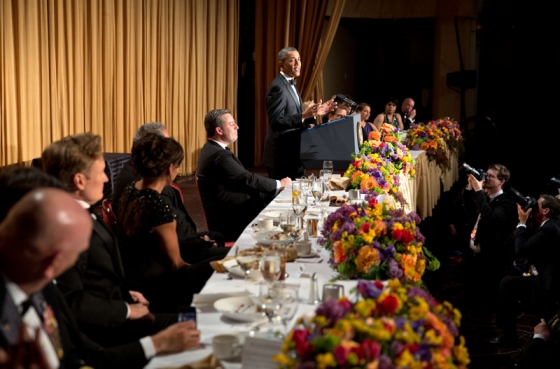The White House Correspondents’ Dinner – the annual gala of journalists, celebrities, and (at least this year) the stars of Duck Dynasty – was held Saturday night in Washington. President Obama reconfirmed that, for someone so allegedly aloof and unable to speak without a teleprompter, he’s pretty damn funny. Funnier than Conan O’Brien, and even funnier than Kevin Spacey’s House of Cards spoof.
The Correspondents’ Dinner is an annual tradition, and so is the backlash against it. This year it was Tom Brokaw denouncing how celebrity-crazed the event has become.
Brokaw and other critics have a point. This dinner exemplifies the chumminess between politicians and journalists in Washington. I wouldn’t draw a straight line between the dinner and, say, the media’s failure to see the flimsiness of the Bush administration’s case for invading Iraq. But seeing President Bush joke about the fruitless search for WMDs in front of a crowd of journalists, it’s hard not to feel uncomfortable.
That being said, critics of the White House Correspondents’ Dinner should save their outrage for something better. Sometimes, the event can actually make news, such as when Stephen Colbert soured the warm feelings in the room with his biting satire of President Bush in 2006. Regardless, it’s nice to see Washington not take itself seriously, at least for one night. It’s easy to become stricken with angst about the future of our country when poll numbers reveal that a third of Republicans believe Obama is a Muslim. But when Obama refers to himself casually in his monologue as a “Muslim socialist,” it’s hard not to see the ridiculousness of such debates.
When talking about journalism, we often refer back to the golden age of reporting. This golden age is mostly a myth. While the founding fathers rightly noted the importance of a free press to democracy, the press in those days was mostly partisan rags that served as mouthpieces for political parties. Not until the early 20th century did journalism become a profession dedicated to objectivity. Even in the heyday of investigative journalism in the 1960s, do we think that Washington reporters and politicians weren’t friendly? Politicians, especially in the White House, are the people with the information. Common sense tells us that it’s probably hard to cultivate sources unless you’re on somewhat good terms.
I think the best part of modern journalism is that, because there’s so many diverse outlets, you can always find a good source for knowledgeable, critical coverage of news and policy. Many of these sources are unpaid bloggers with no training in journalism. There’s a danger to the ease at which technology has let us disseminate news and opinion, but there’s also tremendous upside. I feel confident that, even if the Washington press corps sometimes falls down on the job, other members of the media are ready to take up the slack.
So let’s all agree to stop fretting over the White House Correspondents’ Dinner. Plus, more people probably watch CSPAN that one night than the rest of the year combined, so let’s be nice to the folks who have to sit through and record all those bloviating Senate speeches, shall we?

There is no reason why critics should “lay off” the dinner. Journalism is about holding people/events honest, not “laying off” anything. The dinner represents the sycophantic relationship between the press corps and Obama. At a White House Correspondents Dinner a few years ago, Obama joked that everyone present voted for him. With the exception of a few media outlets, that’s true. When was the last time any member of the press corps asked Obama a tough question? I am no Bush fan, but the same press corps hammered Bush at every turn.
You also misrepresent journalism in the early days of the US. Yes, it was intensely partisan. But there was plenty of nastiness all around, no party or person was spared. Today, by contrast, the President is rarely challenged by the press corps.